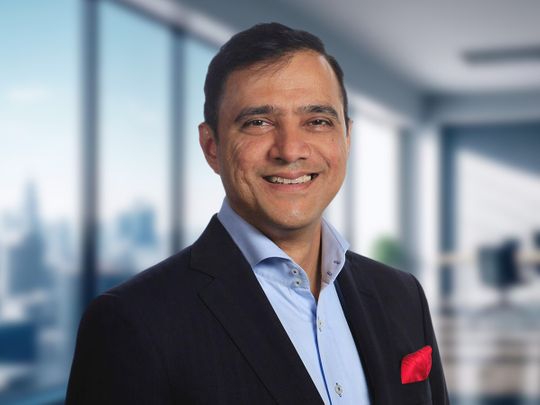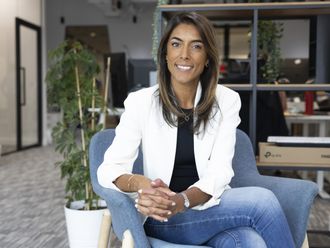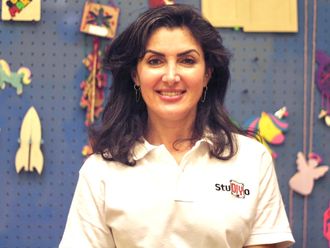
Dubai: Chirantan Joshi may be well regarded among fellow entrepreneurs as a serial industrialist who helps runs five businesses with a yearly turnover of over Dh100 million. However, to friends and family, he is first a people’s person who doesn’t mind splurging on others but often wary about spending on himself.
“Observing and connecting with people is my favourite activity; sometimes, I even leave tasks behind to focus on people, but I often end up having to adapt to myself being a go-getter to get things done,” said the 48-year-old Indian expat who has been living in Dubai for over 25 years.
Joshi's first job was as a sales executive in an office furniture company, earning Dh4,000 as his first salary in 1998 and leaving the position in December 2003, making Dh5,000 per month. He would save at least 20 per cent of his income from salaries and commissions and did that for four years.
That’s when he decided to start his first business in 2003. Since then, he helped start four other companies, which offer relocation services, leather repair services, home maintenance and cleaning services. Aside from these, Joshi also co-started an office furniture company and a networking forum.
Sometimes, I even leave tasks behind to focus on people, but I often end up having to adapt to myself being a go-getter to get things done
All five businesses are self-funded
When it comes to funding the five businesses, Joshi said that he and his business partners had self-funded all of their start-ups, without needing to seek external financing. However, he added that it took around 2 to 4 years to cross the break-even mark and turn the businesses profitable.
Joshi's first business was a furniture moving company, where the initial capital required was Dh75,000, mainly used for managing the trade license costs, rents, and other working capital. "We did not buy any assets in the first year. Only after making money did we start buying assets such as trucks, vans, warehouse racks, etc.," he said.
"The only strategy we follow in all businesses is to follow our cash flow closely. Keeping the unwanted cost low is critical for business. We have mostly chosen to start service-based businesses with lower initial capital requirements. The typical costs involved in our businesses include trade licenses, office spaces, warehouses, recruitment of 6 to 8 people, and marketing expenses.
“All other resources could be leased when we had work on hand. We first started in 2003 when the labour market was not very structured, allowing us to hire help from the market on an hourly basis and rent vehicles as and when required."

Forced to close down second business
The next business was a retail readymade garments store, but it went bankrupt after four years and was closed down. Since then, Joshi said he chose businesses that require less initial capital investment so that they could self-fund them.
As Joshi's entrepreneurial journey began with moving services, with him working for an office furniture supplier as his business partner, they left the job and began offering moving services given that they had the experience of handling furniture – an important part of the moving business.
"We initially focused on office moving and furniture installation as our background was in the office furniture industry. We later added home moving, storage and international relocation to our moving portfolio. We started our business from self-funding. Therefore we never invested more than Dh500,000 to Dh1 million per business. We still have all the businesses self-funded.
"After focusing on office relocations and furniture installation services for the business, we slowly moved towards home relocations, storage and international relocations. These businesses have similar target markets, so we could share some of our clients and build the ecosystem around moving services."
After first focusing on office relocations and furniture installation services for the business, we slowly moved towards home relocations, storage and international relocations
Entrepreneur's tip #1: When the business is small, focus is on increasing your market share
Joshi only took 20 per cent of the profits out of business for themselves, with the rest reinvested into the company for its growth. “We still follow a similar formula and invest those profits in creating other services, new businesses and managing our cash flows. We were able to grow 50 to 100 per cent annually for the first 3 to 4 years since the overall market was in the growth phase," he added.
"We had no experience doing business, but our common sense said, if we can keep our customers happy, they will become our ambassadors, and that happened. Today more than 70 per cent of our business comes from referrals from past or existing clients, and approximately 70 per cent of our revenue comes from repeat customers.”
Entrepreneur's tip #2: Finding right talent may be luck, but keeping them with you is a skill
For retaining staff, Joshi states money is only one part; the other important part is to impart clarity. The team wants clarity about what is expected of them and what they will get if they do it.
“While money is important, the working culture is more important for retention. Maintaining the dignity of a working individual is the top priority. Continuous communication is the key to maintaining clarity,” he said.
“In all our businesses, we are big fans of daily huddles; it's our daily opportunity to align our team towards the common objective. During daily huddles, we can address bottlenecks before they turn into problems. We also have weekly, monthly and quarterly meetings with our teams and within different departments to keep the conversations alive."

Entrepreneur's tip #3: Test the market or your strategy before putting all your resources into it
Joshi admitted making mistakes in their retail readymade garments business, which they later shut. "When running a fashion retail store, we invested heavily in taking prime real estate for the showroom and also ordered a lot of stocks to fill the racks without really testing what customers liked. And ultimately, we realised that our customers wanted different products than what we offered them. But in the process, we lost more than a $1 million [Dh3.67 million]."
Hence, testing the market or business strategy before putting all your resources into it is essential. "We have done this, going forward, by checking the sales trends and if we are getting sustainable pricing for our services. If you see sales growing and getting the required pricing, you focus on investing more in the business to build it,” he added.
And if the company is making a loss, you can continue doing business if you manage cash flow well. For managing cash flow, Joshi said that setting the right expectations in the beginning is crucial, which is achieved through clear communication during the proposal negotiation, continuous contact with the sales team about the importance of positive cash flow, understanding the payment process and paperwork of the client before starting the project.
"For us, the only successful strategy is to be consistently reliable for customers, which helps us win multiple projects at higher margins than our competitors. For example, we managed complete furniture installation for projects like Royal Atlantis, Paramount Hotel, Armani Hotel etc., when our quote wasn't the lowest.
"Also, within the first 12 months, we were able to work with clients like RTA and Emaar, and we are still servicing these clients after 20 years. In the last 20 years, we acquired customers like ADNOC, ADEC, many other oilfield companies in Abu Dhabi, government and semi-government organisations in Dubai, multinational corporations and 5-star hotels."











